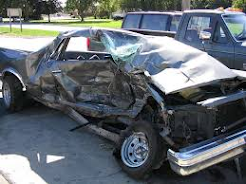Drunk driving fatality
Drunk driving fatality is something at which I have had considerable and intimate experience. Back in the not-so-distant days when I still permitted myself the manifold pleasures of hard alcohol, I committed atrocities behind the wheel that, when I recollect them now, quite literally give me chills.
It is a miracle, really, that I am around to write about these vehicular carousings, that the only blood to be shed in all those wild years came when a friend and I received minor facial cuts after whacking into the windshield of a car that had just encountered a telephone pole; this was 1965 and we were on our way out to dinner, after celebrating Lyndon Johnson's great "We shall overcome" speech with several tumblers of Scotch.
In bed in the shank of the night I am sometimes attacked by a flood of these memories, of nights careening wildly along the highways of my past, and I shudder. The memories are uniformly vivid and unpleasant, and I do not plan to add to their rather daunting number. But I am not here for a confession or a lecture. I did not quit drinking (I switched to wine) and I am not going to urge you to. But I did stop getting behind the wheel after having drinks, because in that circumstance the car becomes a lethal weapon.
This is the simple truth that millions of Americans refuse to understand or admit. A car with an intoxicated driver is precisely as dangerous as a loaded gun in the hands of someone who is blinded by rage. The combination of an instrument with the power to kill and a person who is past the powers of reason is precisely the same in both cases. In domestic murders as with drunk driving, there is no malice aforethought or premeditation. But in both cases the end result is a crime; it's just that when drunk driving is the cause, we too rarely are willing to treat it as one.
Could the real reason for this be that we have effectively legalized drunk driving fatality? Like gambling and pot-smoking, is it now so widespread that we tacitly condone it, or at least ignore it as a major social problem?
Certainly that is what most of the evidence suggests. The press repeatedly reports about people who have been convicted over and again of drunk driving, yet continue to be licensed to operate a car.


Comments
Post a Comment